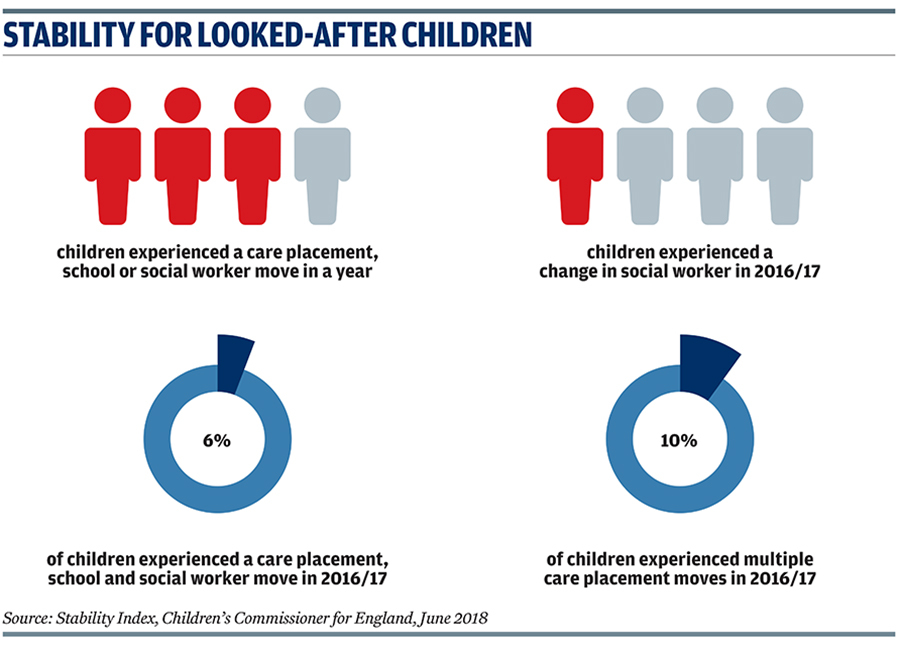Inspections Clinic: Inspecting stability
Jo Stephenson
Tuesday, October 30, 2018
Ensuring looked-after children have a stable care placement, social worker and school place is vital to good outcomes, so Ofsted places great emphasis on stability when it inspects children's services, writes Jo Stephenson.

Stability is key when it comes to ensuring looked-after children are able to flourish, yet it is clear councils and partners are struggling to get this right.
Findings from the children's commissioner for England's second annual Stability Index, published earlier this year, show nearly three-quarters of children in care experienced a change of home, school or social worker in the course of a year. More than one in 20 had experienced all three kinds of change during 2016/17.
In response to calls for a more joined-up approach across the care system, this summer the Department for Education announced it would be establishing a National Stability Forum for children's social care (see below).
Stability is something Ofsted looks at closely when inspecting councils under the Inspection of Local Authority Children's Services framework, as well as during inspections of fostering and adoption agencies and children's homes, according to national director for social care Yvette Stanley.
"All children need to feel a sense of belonging and security, but this is especially important for the children in our care who are likely to have experienced significant trauma, upheaval and distress," she says.
However, she acknowledges many local authorities are finding it increasingly difficult to achieve the kind of stability they want for all the children in their care, with shortages of foster carers and high staff turnover partly to blame.
National data on the stability of placements shows there has been little change in the past few years.
"Where we see local authorities with high variance above or below the national level, we'll discuss that with the local authority," says Stanley. "It's the quality of the social work we find on inspection that enables us to see how well they are doing.
"We also look at whether leaders and managers are creating the environment to achieve a more stable workforce and if that makes a real difference for the children."
The kind of information Ofsted looks at includes data on number of placement moves, changes of social worker and children placed a long way from home.
Important factors
Inspectors also consider a wide range of other factors that may help children feel settled and secure, says Stanley. This could be the information children are given about carers before they start living with them, whether or not they have a meaningful say in what happens in their lives, contact with relatives and friends, and whether they have been able to stay living with siblings.
"Our inspections take a broad view of children's experiences. We do that partly by looking at data and case records, but mostly by speaking to children, carers and professionals," says Stanley.
For her, perhaps the most crucial issue is the quality of relationships children have with the adults responsible for their care.
"This is fundamental; if children don't feel valued and loved, and have no one they feel they can turn to, all the best systems and procedures won't make up for that," she says.
Other key factors that contribute to good stability for children include success in recruiting and supporting foster carers, good decisions about where children should live, and ensuring they get support at the right time, especially when it comes to education and emotional wellbeing.
"The best local authorities have really good, co-operative relationships with all agencies that support children, such as health, the police and schools," says Stanley.
Having a stable workforce and ensuring children's social workers have manageable caseloads is also key, she adds.
"If social workers are to build lasting and trusting relationships with children, they need the time and space to do good quality direct work," says Stanley. "The best local authorities have been able to do this, and we have seen the benefits for children in several ‘good' and ‘outstanding' local authorities."
Common trends in those performing less well include leadership instability, high staff turnover, a shortage of suitable carers and an overall "lack of ambition" for children in care and care leavers.
Corporate parents need to act more like "a pushy parent" by keeping a very close eye on children's progress and having high aspirations for them, stresses Stanley. They also need to work closely with schools and "challenge them where necessary".
"We know many children in care experience delays in finding places at the right school, despite statutory guidance," she says.
Local authorities should seek to learn from best practice elsewhere, she advises. "Above all, listen to children's views and, wherever possible, act on them."

National forum will promote stability for children in care
The Department for Education committed to establishing a National Stability Forum for children's social care in Fostering Better Outcomes, it's response to the 2018 fostering stocktake and an inquiry into foster care by the education select committee.
According to the DfE, the new forum, which will be chaired by the department's director general, will enable a "national policy approach to improving looked-after children's outcomes", including looking at different approaches to permanence and care planning, and how these could be best used.
The move has been welcomed by organisations such as adoption and fostering charity The Adolescent and Children's Trust (TACT), which has long pushed for the establishment of such a body. "We know how important stability is, so this is a very welcome development," says TACT chief executive Andy Elvin. "It is great that the DfE has taken ownership of this by having such a high ranking civil servant chairing the forum."
He hopes the forum will "show leadership and promote practice and systems that focus on all children in care", and adopt a stability index approach to monitor progress. "The one the children's commissioner has put forward is a good starting point," he says.
Key issues it needs to address include the "dysfunctional care market" and foster carer recruitment and retention, says Elvin, who would like to see the creation of wider permanence teams in all areas.
Ofsted's national director for social care Yvette Stanley is also pleased the forum will span "all available routes to permanence" and is keen to play an active role. "Try stopping me," she says.
She wants to see the forum provide "firm strategic leadership" and be a platform for sharing good practice and successful innovations.
It also needs to provide "constructive challenge as necessary where standards and performance needs raising or policy needs reviewing", she stresses.
"We have to make sure that children's voices are heard on this forum," she adds "Care-experienced children and young people really are the experts. It's so important we listen to them."
FURTHER READING
Revised ILACS framework, Ofsted, September 2018
Fostering Better Outcomes, DfE, July 2018
The Children's Commissioner's Stability Index 2018, Office of the Children's Commissioner for England, June 2018
INSPECTIONS SHORTS
SCHOOLS
Schools will receive a judgment for "quality of education" under plans for a new education inspection framework. Proposals unveiled by Ofsted's chief inspector Amanda Spielman would see the category replace separate ratings for "outcomes for pupils" and "teaching, learning and assessment". Schools would be judged on "personal development", "behaviour and attitudes" and "leadership and management". Spielman said one goal of the framework was to reduce the emphasis on performance data such as test and exam results. A consultation on the draft proposals is due in January.
SOCIAL CARE
Councils where children's services are deemed "inadequate" will receive shorter, less intensive re-inspections, Ofsted has announced. The change to the Inspection of Local Authority Children's Services (ILACS) system means inadequate councils will no longer receive a three-week single inspection framework (SIF) visit when re-inspected, but instead get a standard two-week ILACS inspection. Ofsted's national director for social care Yvette Stanley said this new streamlined approach made sense "both for inspection and for the sector".
YOUTH JUSTICE
Low staffing levels and heavy caseloads are affecting the quality of services provided by Bristol City Council's Youth Offending Team (YOT), according to inspectors. HM Inspectorate of Probation rated the YOT "requires improvement" overall amid concerns the efforts of committed managers and frontline workers were being "severely hampered" by staffing shortages. The YOT was rated good in five areas, including leadership and governance, but "requires improvement" for seven areas including staffing. A full review of the service was launched in the summer.
EARLY YEARS
Ofsted has published new guidance on the information and checks it requires for people connected with registered childcare including childminder assistants, committee members and trustees. The guidance also sets out the requirements for people who live with current or prospective childminders and employees, such as cleaners who regularly work in a setting when children are present.
GENERAL
All Ofsted inspection reports can now be accessed from a new website designed to be quicker and easier to use. The site at www.reports.ofsted.gov.uk is mobile-friendly and has had a good response so far, says the regulator. "By making our reports easier and simpler to find, we hope that parents and learners will find it even more helpful to make informed choices," said Ofsted. "In the same way, providers will be able to access information about themselves or other providers more easily."




